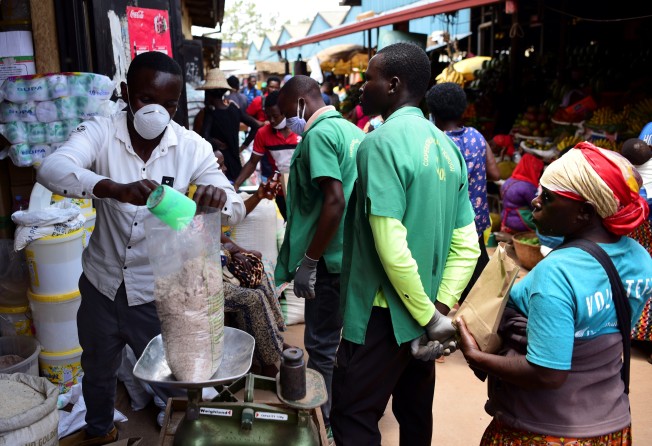Africa’s coronavirus outbreaks seeded from Europe
- Many African countries reacted quickly to the pandemic, but they have not avoided economic harm
- Despite strong economic links between Africa and China, most cases appear to have been seeded by European travellers or Africans returning from continent

This story is published in a content partnership with POLITICO. It was originally reported by Simon Marks on politico.eu on March 19, 2020.
Just a few weeks ago, the gaze of African governments and health officials was fixed firmly on China as the likely source of the new coronavirus coming to their countries.
But with cases there now dwindling and Europe having become the new epicentre for the virus, they are no longer looking East, but North.
Despite the strong economic links between Africa and China and the disease originating there, most of the cases in African countries appear to have been seeded by European travellers or Africans returning from that continent.
In Rwanda, one of the latest cases of coronavirus to be confirmed was a Rwandan man who arrived home on March 16 after visiting Belgium.
The first two cases in Burkina Faso were a husband and wife who had returned home after attending a prayer conference in France. And the Cameroonian government on Thursday said that three passengers on board an Air France flight from Paris had tested positive after touching down in Yaounde on Tuesday.
“If this was a war analogy I would say we had all programmed our missiles facing [toward] the East. But the threat finally came from the North,” John Nkengasong, director of the Africa Centres for Disease Control and Prevention, told reporters at the African Union headquarters in Addis Ababa on Thursday.
Governments across Africa in recent days have been quick to announce strict travel bans to their countries as the number of coronavirus cases rose to 640 and the number of deaths to 16 on Thursday.
Rwanda this week said all commercial passenger flights would be grounded for 30 days starting on March 20, while South Africa, Kenya, Uganda and Tanzania were all expected to announce similar measures.
While the number of officially confirmed cases is still low, many experts expect outbreaks in African countries to escalate rapidly – just as they have all over the globe.
“This virus is a deadly enemy we are dealing with and we cannot look at the numbers and be complacent,” said Nkengasong. “It’s going to change dramatically in the next week.”
Still, African countries have been quick to take measures such as banning large gatherings and travel to their countries.
Ethiopian airlines, for example, the continent’s largest carrier, has been forced to cancel passenger flights to Bahrain, Egypt, Djibouti, Lebanon and Kenya.
This has been credited by some to the continent’s experience dealing with the 2014 Ebola outbreak in West Africa, which killed more than 11,000 people and forced governments to improve their surveillance, contact tracing and laboratory testing methods.
Travel restrictions applied early may help to reduce the number of cases on the continent, but they have not prevented economic havoc.
The UN’s Economic Commission for Africa last week cut this year’s GDP growth estimate for the continent from 3.2 per cent to 1.8 per cent and spoke of multibillion-dollar loses for countries such as Nigeria, which are dependent on healthy global oil prices.
“Unfortunately it’s getting worse,” said Vera Songwe, executive secretary of the UN’s Economic Commission. “Those of us who are mathematicians understand what exponential means and know it when we see it,” she added, referring to the escalating nature of the epidemic. The number of coronavirus cases in Africa has increased 30 fold in just a week.
Gianfranco Rotigliano, who coordinated the Unicef response to the Ebola outbreak in West Africa and the Democratic Republic of Congo, said that a growing coronavirus epidemic would be difficult to hide.
“There’s no way that if you have a real epidemic that those cases can go undetected. If you have hundreds or thousands of cases, they will be detected,” he said.
He also underlined the huge risk for Africa should the virus enter any of its massive slums or refugee camps.
“I don’t think the African health facilities are well equipped to deal with a big crisis,” he said. “There is also a risk that it spreads if it enters big, densely populated, poor neighbourhoods in places like Nairobi, Kinshasa or Lagos where people live together side by side. Self quarantine in these areas is almost impossible.”
Purchase the China AI Report 2020 brought to you by SCMP Research and enjoy a 20% discount (original price US$400). This 60-page all new intelligence report gives you first-hand insights and analysis into the latest industry developments and intelligence about China AI. Get exclusive access to our webinars for continuous learning, and interact with China AI executives in live Q&A. Offer valid until 31 March 2020.